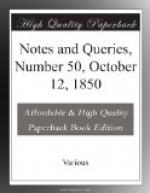W.H.F.
“Pride of the Morning.”—Why is the small rain which falls in the morning, at some seasons of the year, called “the pride of the morning?”
P.H.F.
Bishop Durdent and the Staffordshire Historians.—It is stated by Sampson Erdeswich, Esq., in his Survey of Staffordshire, p. 164, 12mo. 1717, that—
“Not far from Tame, Roger Durdent held Fisherwicke of the bishop, 24 Ed. I. And 4 Ed. II. Nicholas Durdent was lord of it, which I suppose was procured to some of his ancestors of the same name by their kinsman Walter Durdent, Bishop of Litchfield, in Henry II.’s time.”
but no authority is given for this statement.
In Shaw’s History of Staffordshire, p. 365., fol., 1798, it is further recorded that—
“Walter Durdent, in the beginning of Henry II., appears to have granted it (Fisherwicke) to some of his relations, for we find William Durdent of Fisherwicke temp. Henry II.; and in the 40th of Hen. III. Roger Durdent occurs, who held Fisherwicke of the bishop, 24 Ed. I. In the 4 Ed. II. Nicholas Durdent was lord of it.”
Shaw refers to Erdeswick, and to the Annals of Burton Abbey, p. 364.
In Dr. Harwood’s edition of Erdeswick, 8vo., 1844, the same statements are repeated, but no authority is adduced. Could any of your correspondents obligingly furnish me with the original {310} sources of information to which Erdeswick had access, and also with any biographical notices of Bishop Durdent besides those which are recorded in Godwin and Shaw? The bishop had the privilege of coining money. (See Shaw’s Staffordshire, pp. 233. 265.) Are any of his coins known to numismatists?
F.R.R.
Pope and Bishop Burgess.—To what passage in Pope’s writings does the conclusion of the following extract refer?[1]
“Digammaticae doctrinae idem accidit. In his Popius eam in ludibrium vertit, &c. Sed eximius Poeta neque in veteribus suae ipsius linguae, nedum Graecae monumentis versatus, tantum scilicet de antiqua illa litera vidit, quantum de Shakespearii SAGITTARIO.”
W.W.
[Footnote 1: 3d ed. of Dawes’s Mis. Critic, p. xviii, note x.]
Daniel’s Irish New Testament.—F.G.X. will be much obliged for information on the following points:—
1. Which is the most correct edition, as to printing and orthography, of Daniel’s Irish New Testament?
2. Does the edition now on sale by the Bible Society bear the character for incorrectness as to these points, which, judged by itself, it appears to deserve, or is it really, though “bad, the best?”
3. F.G.X. is far advanced with an Irish Testament Concordance. Can any one possessed of the requisite information give him hope of the acceptableness of such a publication? He should expect it to be chiefly useful to clerical Irish students in acquiring a knowledge of words and construction; but the lists of Irish Bibles disposed of of late years would lead to the supposition of its being desirable also as pointing out the place of passages to the native reader.




